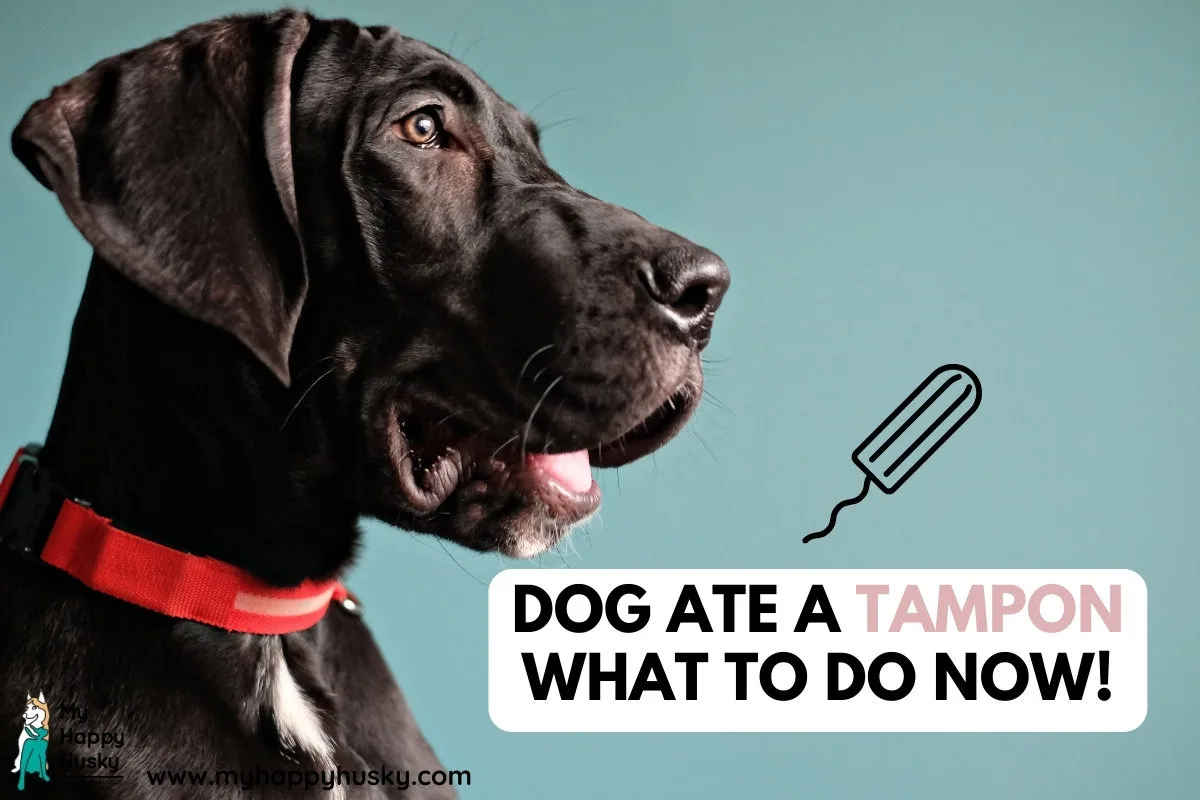Ah, the unexpected adventures of dog ownership. Finding out your dog ate a tampon can be worrying, but don’t panic. Let’s walk through what you need to do.

1. Stay Calm and Assess the Situation
First things first, stay calm.
Dogs are curious creatures and sometimes they get into things they shouldn’t. Try to figure out if it was a used or unused tampon and how many might have been ingested.
This information is crucial for your vet.
2. Contact Your Veterinarian Immediately
Call your vet right away.
Tampons can cause blockages in your dog’s digestive system, which might require medical attention.
Describe the situation in detail to your vet, including the type and size of the tampon and how long ago it was ingested.
3. Watch for Symptoms
While you’re sorting things out with your vet, keep a close eye on your dog.
Symptoms to watch for include vomiting, diarrhea, a swollen abdomen, loss of appetite, lethargy, or difficulty defecating.
If you notice any of these signs, it’s important to tell your vet.
4. Follow Your Vet’s Advice
Your vet might advise you to bring your dog in for an examination.
In some cases, they might suggest monitoring your dog at home.
Follow their advice closely. They know what’s best for your dog’s health and safety.
5. Do Not Induce Vomiting Yourself
Do not try to induce vomiting unless specifically instructed by your vet.
Doing so can cause more harm than good, especially if done incorrectly.
Your vet will provide the safest course of action based on the specifics of the situation.
6. Prevent Future Incidents
Once the immediate situation is handled, think about prevention.
Ensure bathroom doors are closed, and tampons and other personal hygiene products are out of your dog’s reach.
Dogs often repeat behaviors that get them attention or satisfy their curiosity, so removing the temptation is key.
Is Your Dog a Puppy, Adult or Senior?
The age of your dog can significantly impact the situation if they’ve ingested a tampon or any foreign object. Here’s how age plays a role:
Puppies
- Puppies are more curious and likely to chew on and swallow non-food items. However, their smaller size means there’s a higher risk of a foreign object like a tampon causing a blockage in their digestive system.
- Puppies also have a more delicate digestive system, so they might react more severely to such incidents.
Adult Dogs
- Adult dogs might have a better-developed digestive system, but the risk of obstruction still exists. The size and health of the dog can influence how they handle ingesting a foreign object.
- Adult dogs may have a better chance of passing the tampon without complications, but this isn’t guaranteed. Monitoring and veterinary guidance are still crucial.
Senior Dogs
- Senior dogs might have a slower digestive process and could be more prone to health complications if they ingest a tampon. They might also have pre-existing health conditions that could be exacerbated by a foreign body in their system.
- Older dogs might be less resilient in recovering from any potential surgical intervention if it becomes necessary to remove the tampon.
In any case, regardless of age, if your dog ingests a tampon, it’s important to contact your vet immediately for advice.
When Will My Dog Poop Out a Foreign Object?
If your dog ingests a tampon, the time it takes for it to pass through their system can vary greatly. Here’s what you need to know:
Digestion Time Frame
- Typically, the digestion process in dogs can take anywhere from 10 to 24 hours. However, when it comes to foreign objects like tampons, this time frame can be unpredictable.
- Due to the absorbing nature of tampons, they can expand and become lodged, slowing down or even preventing the natural passage through the gastrointestinal tract.
If your dog ingests a tampon, the time it takes for it to pass through their system can vary greatly. Here’s what you need to know:
Monitoring is Key
- Watch for the tampon in your dog’s stool during bathroom breaks. If you don’t see it within a day or two, or if your dog shows signs of distress, contact your vet immediately.
- Signs that the tampon hasn’t passed and may be causing a blockage include vomiting, a lack of appetite, abdominal pain, lethargy, or changes in bowel movements.
Vet Intervention
- If there’s any concern that the tampon is causing a blockage, your vet might need to perform an X-ray or ultrasound to locate it.
- In some cases, surgical intervention may be required to remove the tampon safely.
Conclusion
Remember, dogs are notorious for eating things they shouldn’t. It’s a part of their charm, but also a challenge for us as owners.
Keep an eye on what your dog has access to, and always have your vet’s number handy for these unexpected doggy dilemmas. 🐕🚒🩺🚪
Disclaimer
The advice given in this article is for educational purposes only and does not constitute professional advice in any context. Before making any decisions that may affect the health and/or safety of your dog, you should always consult a trained veterinarian in your local area. For the FULL disclaimer Visit HereCopyright Notice: The content produced and published on My Happy Husky is unique and original. My Happy Husky makes an active effort to search for plagiarized content using plagiarism detection software. If plagiarized content is found, action will be taken.
